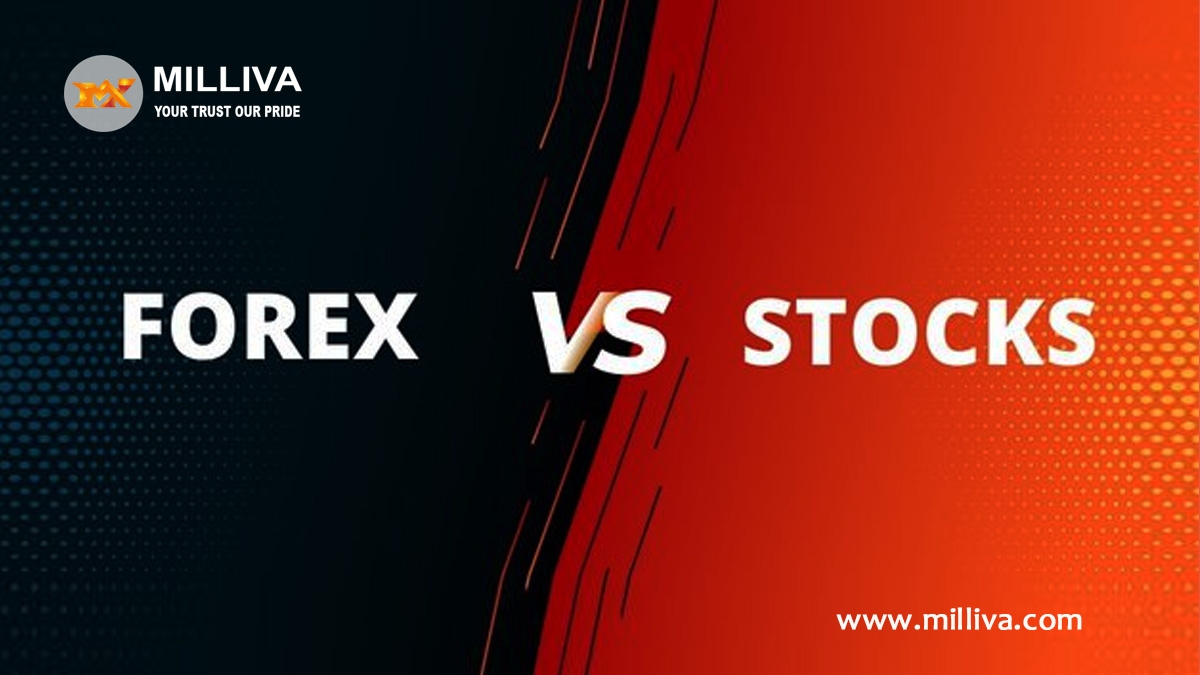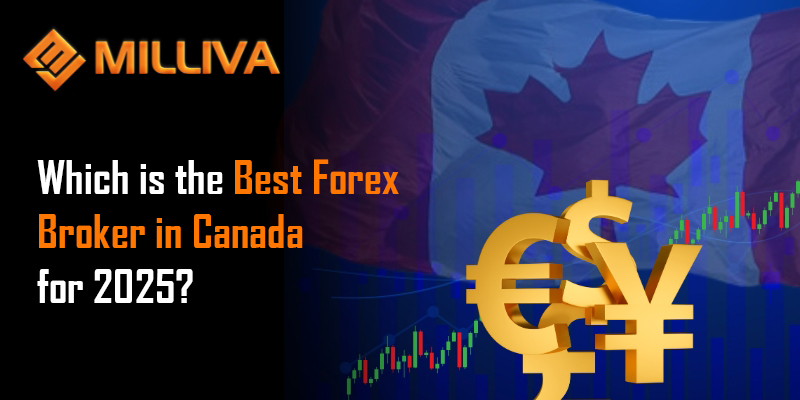Comparing Forex and Stock Market

![]()
Two of the most popular worldwide markets are forex and stock. Knowing which is ideal for your trading strategy and risk tolerance is essential before you begin trading either. View our side-by-side comparison to discover the differences.
From tried-and-true blue chip stocks to the fast-paced futures and foreign currency (or FX) markets. Active traders and investors now have access to an expanding choice of trading products. It hard to choose which one of these marketplaces to invest. And numerous factors should be considered in order to make good choice.
The trader’s or investor’s risk tolerance and trading style may be the most important aspects. Buy-and-hold investors, for example, may choose the stock market. But short-term traders, such as swing, day, and scalp traders, may prefer forex because of its higher price volatility.
There are a few factors to consider when comparing forex and stock blue-chip.
The foreign currency market (commonly known as FX) is the world ’s leading financial market. Most recent Bank for International Settlements report daily average quality and cost of more than $6.6 trillion.
Comparing Forex and Stocks Blue Chip
The forex market attracts many trader. Due to its tremendous liquidity, round-the-clock trading, and the level of leverage available to players. These stocks have a history of paying dividends and are frequently able to stay afloat financially during tough times.
Blue chip stocks are less volatile than many other investments, and they’re typically use to help investors’ portfolios expand consistently.
Blue chips, on the other hand, are equities in firms that are well-establish and financially strong. These stocks have a history of paying dividends and are frequently able to stay afloat financially during tough times. Blue chip stocks are less volatile than many other investments, and they’re typically use to help investors’ portfolios expand consistently.
So, when comparing a forex investment to one in blue chips, what are the important factors to consider?
Volatility:
This is a measure of price fluctuations over a short time period. While some traders, particularly short-term and day traders, profit from market price swings by relying on volatility. Others choose for less volatile and risky products. As a result, many short-term traders rush to the forex markets, while buy-and-hold investors may favour blue chips’ steadiness.
Leverage:
Leverage is a second factor to consider. In the United States, stock investors may often get a 2:1 leverage on their investments. The forex market offers far larger leverage, up to 50:1, and even higher leverage in some regions of the world. Is all of this leverage beneficial? Certainly not. While leverage may help develop equity with a little initial investment. Forex accounts can be start with as little as $100—it can also be use to ruin a trading account. The best forex broker in India provides leverage upto 1:500.
Trading Hour:
Operating Hours time period during which trading instrument is transact is another consideration to consider when choosing a trading instrument. Exception of market holidays, stock trading sessions are confine to exchange hours, which are normally 9:30 a.m. to 4 p.m.
Monday through Friday, EST (Eastern Standard Time).The currency market, on the other hand, is open 24 hours a day, from 5 p.m. EST on Sunday to 5 p.m. EST on Friday, and it begins in Sydney and ends in Tokyo, London, and New York. Traders whose schedules would typically limit their trading activity.
They will welcome the flexibility to trade at practically any time of day in the US, Asian, and European markets, with enough liquidity.
Comparing Forex and Stock Indexes
There are a few variables to consider when comparing FX and stock indices.
Stock market indexes are collection of equities that have some form of element fundamental or financial that may be used as benchmark for certain sector or the whole market.
United States the Dow Jones Industrial Average (DJIA), the Nasdaq Composite Index, the Standard & Poor’s 500 Index (S&P 500), and the Russell 2000 are all well-known indexes. The indexes can be use by traders and investors to measure the overall market’s movement.
Indexes of the stock market are utilized in a range of products to provide traders and investors with broad market exposure. ETFs that monitor stock market indexes such as the SPDR S&P 500 ETF Trust (SPY) and the Invesco QQQ, which measures the Nasdaq 100 Index, are popular.
Stock index futures and e-mini index futures are two other prominent instruments based on the underlying indices. The e-minis have grown popular among short-term traders due to their favorable average daily price ranges.
Furthermore, the contract size is significantly less expensive than full-sized stock index futures contracts. E-mini S&P 500, the e-mini Nasdaq 100, the e-mini Russell 2000, and the mini-sized Dow Futures are all traded on all-electronic, transparent networks around the clock.
What are the important distinctions to keep in mind when deciding between a forex investment and one based on an index?
Volatility:
The volatility and liquidity of e-mini contracts appeal to many short-term traders who trade stock market indexes. Assume that the main equity index futures trade at a notional value of $145 billion on a daily basis.
Surpassing the underlying 500 stocks’ total traded dollar volume.The typical daily range in the price movement of e-mini contracts offers a huge opportunity.
While e-minis’ average daily traded value is small in contrast to forex markets, they provide many of the same benefits as FX traders, such as steady liquidity, daily average price movement quotations that favour short-term gains, and trading outside of regular U.S. market hours.
Leverage:
Futures traders have access to high amounts of leverage, comparable to what FX traders have. Margin, which is a necessary deposit that a broker might use to offset account losses, is the leverage in futures. The exchanges where the contracts are exchanged establish the minimum margin requirements, which can be as little as 5% of the contract’s value.
Brokers may impose greater margin requirements. Futures traders, like forex traders, may trade big position sizes with a small commitment, allowing them to make huge profits—or suffer devastating losses.
Trading Hours:
Hours of trading While electronic traded e-minis trade nearly 24 hours a day (trading stops for about an hour a day to allow institutional investors to value their positions) Volume will most certainly be smaller than in the FX market, and liquidity during off-market hours may be an issue depending on the contract and time of day.
Forex and Stock Equities
When it comes to taxes, there are several options, there are several options. these various trading instruments are regarded differently. For example, short-term profits on futures contracts may be taxed at a lower rate than short-term gains on equities.
Active traders may also be qualified for the IRS’s mark-to-market (MTM) status, which allows them to deduct trading-related expenditures including platform fees and education.
The IRS expects trading to be the individual’s principal business in order to claim MTM status. Publication 550 of the Internal Revenue Service explains how to properly qualify as a merchant for tax purposes. To best manage investment activities and related tax responsibilities, traders and investors should seek the guidance and skills of a trained accountant or other tax professional, especially since trading forex may be a complicated time managing your taxes.

Visit us at: www.milliva.com







Measuring Liquidity in Finiancial Markets
07th Jul 2022[…] any cash or credit cards and only have stock certificates? After that, you’ll have to do some stock market trading. Only then will you be able to purchase the washing machine with cash. Even though stock is a […]
Factors that Affecting and Influence Forex Trading
17th Aug 2022[…] of the most apparent markers of an economy’s health. The publication of public information in stock markets is simple to […]
Head and Shoulders Trading Pattern in Forex - Milliva
18th Aug 2022[…] prices are the outcome of a constant tug-of-war; whether a stock’s price rises or falls is directly proportional to the number of individuals on either team. Those that believe a […]
How to Trade with Trading Volume in Forex
22nd Aug 2022[…] market moves against you because it can leave you in positions you can’t get out of. In the stock market, in particular, less liquidity can result in wider bid-ask […]
Comparing Forex Market with Stock Market
01st Sep 2022[…] Forex Vs the Stock Market […]
Easy Method To Make $1000 Per Day In Forex Market
14th Sep 2022[…] you’re wondering how to make 1000 rupees every day from the forex market, consider the strategies […]
How Can I use Donchian Indicator in Forex Trading
23rd Sep 2022[…] and instead forecast a bearish reversal coming. Sell signals are particularly prevalent in the stock market because of how erratic and volatile stock values are known to […]
How to Create Profitable Trading Setups
26th Oct 2022[…] is fixed in stock market. So it is not necessary that each of the consolidations would be smaller than the impulse wave. […]